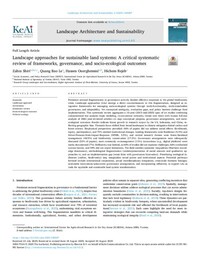Landscape approaches for sustainable land systems: A critical systematic review of frameworks, governance, and socio-ecological outcomes

Authors:
Persistent sectoral fragmentation in governance actively hinders effective responses to the global biodiversity crisis. Landscape approaches (LAs) emerge a direct countermeasure to this fragmentation, designed as integrative frameworks for managing socio-ecological systems through multi-functionality, multi-stakeholder governance, and adaptability. Yet conceptual ambiguity, evaluation gaps, and policy barriers challenge their implementation. This systematic review aggregates a 10-year (2015–mid-2025) span of LA studies combining computational text analysis (topic modeling, co-occurrence networks, trends over time) with human full-text analysis of 2682 peer-reviewed articles—to map conceptual progress, governance arrangements, and socio- ecological outcomes. Results indicate linear growth in research output by the US, Indonesia, and China, reflecting geographic bias. Thematic focus shifted from broad landscapes to climate mitigation-linked carbon and forest science. Biophysical perspectives prevailed: 66% of papers did not address social effects (livelihoods, equity, participation), and 74% omitted institutional changes. Leading frameworks were Resilience (5.4%) and Driver-Pressure-State-Impact-Response (DPSIR, 3.5%), and central research themes were forest/farmland management (48.5%) and biodiversity conservation (17.2%). Governance arrangements were infrequently discussed (32% of papers), most commonly co-management (11%); innovations (e.g., digital platform) were rarely documented (7%). Reflexivity was limited, as 60% of studies did not examine challenges, 66% overlooked success factors, and 59% did not report limitations. The field exhibits epistemic inequalities (Northern knowledge dominance), methodological fragmentation (underrepresentation of social sciences and qualitative approaches e), and an implementation gap (weak links with governance/innovation). Prioritizing ecological indicators (carbon, biodiversity) may marginalize social justice and institutional aspects. Potential pathways forward include international cooperation, actual interdisciplinary integration, cross-scale thematic linkages, actionable innovations/polycentric governance arrangements, and incorporating reflexivity to support LAs as tools for equitable and sustainable land system transformation.
